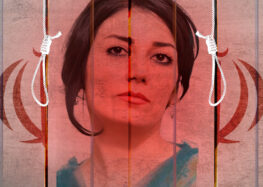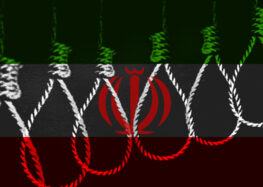Iran’s Security Forces Kill Growing Numbers of Kurdish and Baluchi Border Couriers
 30 Kurdish and 34 Baluchi Couriers Killed by Guards So Far in 2024, Including 1 Child
30 Kurdish and 34 Baluchi Couriers Killed by Guards So Far in 2024, Including 1 Child
“When border agents see a fuel courier…they just start shooting”
September 4, 2023 – An alarming number of border couriers, primarily from Iran’s Kurdish and Baluchi minorities, have been killed in the first eight months of 2024, as Islamic Republic agents use unlawful and lethal force against those who transport goods and fuel across Iranian borders as their only means of survival, said the Center for Human Rights in Iran (CHRI).
From January to August 2024, at least 30 Kurdish border couriers, known as kulbars, were killed and 198 others injured by direct gunfire from Iranian government forces, according to research undertaken by CHRI. Six of the injured were children. One of them was 17-year-old Arian Mamandi from Sardasht, who was shot in the face by border guards and lost an eye.
Over the same eight-month period, at least 34 Baluchi fuel couriers, known as sukhtbars, were killed, and 39 others were injured by direct gunfire from government forces, CHRI’s research showed. One of those killed was 14-year-old Omran Baloch Zahi.
“The ongoing killings of border couriers are yet another example of the Islamic Republic’s use of disproportionate and lethal violence against Iran’s oppressed ethnic communities,” said Hadi Ghaemi, CHRI executive director.
“The Iranian government must immediately halt its unlawful use of lethal force against border couriers and instead focus on developing economic empowerment initiatives. This relentless violence against vulnerable populations must end,” Ghaemi said.
CHRI calls upon the UN and human rights organizations to demand that the Iranian authorities immediately cease the use of lethal force against border couriers, and adhere to the UN’s Basic Principles on the Use of Force and Firearms by Law Enforcement Officials, which explicitly state that the “intentional lethal use of firearms may only be made when strictly unavoidable in order to protect life,” and the UN’s International Standards for Law Enforcement, which strictly restrict the use of force only to situations of absolute necessity and require the use of force to be restrained and proportional.
CHRI notes that while couriers are shot and killed by border agents without warning or trial, Article 22 of Iran’s constitution states, “the life, property, rights, and occupation of individuals are immune from violation.” Despite this, border couriers are losing their lives in growing numbers at the hands of officers who shoot without legal authorization.
“Under Iranian law, those who order and execute the shooting of couriers should be prosecuted and punished, and citizens should have the right to use all available channels to seek justice,” Ghaemi added.
Poverty and Discrimination Force Iran’s Ethnic Minorities into Dangerous Courier Jobs
Kulbars transport goods between the Kurdish regions of Iran and Iraq, while sukhtbars operate in the Sistan and Baluchistan province. With little other available work in these economically depressed areas that are badly neglected by the central government, these border couriers navigate hazardous terrain and face the continuous threat of being shot and killed by Iranian border guards.
The killing of 14-year-old Omran Baloch Zahi was typical of the violent and unlawful actions these couriers are subjected to by Islamic Republic border guards. The guards did not stop and warn the driver of the fuel tanker, but proceeded immediately to shoot at the couriers, according to the HRNA human rights news agency. Omran was shot in the back, his 16-year-old brother was shot in the abdomen, and his 15-year-old cousin was also shot. They were taken to Razi Saravan Hospital for treatment, but Omran died a week later.
The above numbers represent an increasing use of lethal state force against the couriers. During the 12-month period from March 2023 to March 2024, at least 27 kulbars, including one 17-year-old child, were killed, and 311 kulbars, including 15 children, were injured by gunfire from Iranian security forces, according to the Kurdistan Human Rights Network. Meanwhile, at least 40 sukhtbars were killed by Iran’s security forces in 2023, and 19 others were injured, according to the Baluch Activists Campaign. One of the sukhtbars killed was a child, 15-year-old Edris Gomshad Zehi Gorgij, who was the only breadwinner in the family since Edris’s father was imprisoned.
The entrenched discrimination that the country’s minorities face is the prime driver behind their courier work. Regions predominantly inhabited by ethnic minorities experience severe underdevelopment compared to other areas of the country, and poor access to education and employment forces many to take on dangerous jobs such as border couriers. In addition to the state violence, hundreds of couriers are killed or injured every year in accidents.
“When border agents see a fuel courier … they just start shooting”
CHRI interviewed a 34-year-old sukhtbar from the border city of Saravan in Sistan and Baluchistan province. He explained that the primary reason for taking this job is the severe lack of employment opportunities.
“The main reason I got into this line of work was the lack of jobs and the poverty. I have been smuggling fuel for nearly four years now. There is no reason other than poverty and bad economic conditions that drive people towards this work. I know many juveniles who smuggle fuel. These are children who, due to difficult economic circumstances, cannot continue their education and turn to fuel smuggling. These children don’t even have the money to travel from one village to another to attend school. Almost two or three members of every family I know are involved in fuel smuggling, including children. In border cities and villages like Saravan, the number of juveniles involved in fuel smuggling is very high.
When border agents see a fuel courier, it’s as if they’ve seen ISIS militants. They just start shooting. They don’t even consider the fact that this fuel smuggler is also a human being with a family.”
CHRI interviewed a 40-year-old fuel courier in the city of Chabahar, Sistan and Baluchistan province, who spoke about the extortion couriers also regularly face from border agents.
“In recent years, the number of fuel couriers in Sistan and Baluchistan province has increased significantly. The only reason for this is extreme poverty. There is no other reason for people to risk their lives and become fuel couriers. State agents, in fact, extort money from fuel couriers. They stop them and take any money they have earned, so they won’t be arrested. If we don’t have money, they confiscate our means of transportation, which means our families will suffer because we have no other source of income. Security officers are only interested in extortion. It’s not just the danger of being killed that affects the families of fuel couriers, but also the extortion by the officers that destroys the lives of these families.”
“The authorities treat kulbars like drug traffickers”
CHRI interviewed a kulbar from Kamyaran, Kurdistan province, who described the harsh realities of their work and the violence they face from Islamic Republic security forces.
“Being a kulbar is not easy work. It’s not like you can just go to the border and bring goods with you. The routes are very difficult, and there is a high risk of being arrested, killed, or injured along these routes. In this line of work, there is always the possibility of being shot. Often, the authorities also confiscate our belongings and mobile phones.
The items we kulbars bring are clothes, TV sets, household appliances like vacuum cleaners, juicers, cosmetics, fabrics, and so on. We don’t smuggle drugs or alcoholic beverages, but the authorities treat kulbars like drug traffickers.”
Many Children Work as Couriers—and Face Lethal State Violence
CHRI interviewed a 38-year-old kulbar from Kamyaran in Kurdistan province, who was formerly a pastry chef. Worsening economic conditions and a lack of employment opportunities forced him to become a kulbar. He discussed how many kulbars are young and some even hold professional degrees, yet have turned to this dangerous work as their only means of livelihood.
“It’s not unusual these days to see 18-year-old kulbars. Not long ago, I saw a 12-year-old boy who had come with his father for kulbari. [The father] said his son should be in school, but he didn’t have the means to pay for his education. Right now, 60-70% of the kulbars are under 20 years old. Some are even 15 or 16 years and younger.
Last month, I was working with 12 other kulbars. I was older than all of them. All 12 of them were born in the 2000s. Not only are more children engaged in kulbari, but the number of educated kulbars has also increased. There are young people who even have university degrees but were forced [by economic hardship] to become kulbars.
I myself am a professional pastry chef. However, the economic conditions have become so bad in the past few years that I could no longer continue working as a chef; I had to become a kulbar.”
“Kurdish and Baluchi minority populations should not face state violence for simply trying to survive in regions that have been systematically neglected by the Iranian government,” said Ghaemi.
“Instead of demonstrating their complete disregard for the lives of minority members, Iranian authorities should ensure that education and employment opportunities are available to young people in these communities, so that they’re not forced into courier jobs,” Ghaemi said.
This report was made possible from donations by readers like you. Help us continue our mission by making a tax-deductible donation.






